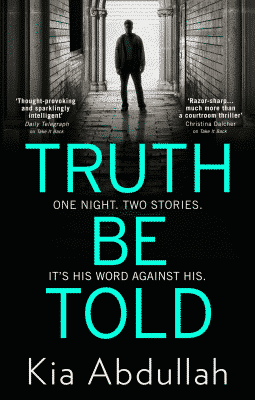
Truth Be Told
A great fan of legal thrillers, particularly those that leave the reader contemplating the law and societal norms, I turned to the latest novel by Kia Abdullah. Full of gritty story telling and tackling the issue of consent, Abdullah pulls readers into the middle of this piece and allows them to become quasi-jury members.
Kamran Hadid has everything he could want, living at a prestigious prep school in the London suburbs and recently accepted to read at Oxford. While his family is quite strict with their Muslim beliefs and their wealth denotes a stoic demeanour, Kamran has found a way to let himself go.
When he overindulges at a party, Kamran finds himself slinking back to his room to sleep it off. In a partial stupor, he feels someone else get into the bed with him and finds that the haze in his brain leaves him somewhat unable to react. He’s sure that he’s been sexually assaulted, though when he wakes up the next morning, he’s still shocked to see Finn Andersen in bed with him.
Kamran tries to piece it all together, but is unable to justify it to himself. He seeks out Zara Kaleel, a counsellor for sexual assault victims who made a name for herself previously when she helped bring four young men to court for another rape.
Kamran not only struggles with understanding what this rape might mean about his sexuality, but how it might fit in the face of a Muslim upbringing. While he oscillates on what to do, Zara does her best to counsel him as a victim and they agree to take things through legal channels.
While the school pushes back, Zara and Kamran are adamant that the truth must come out. Finn Andersen has his own narrative, one in which Kamran did not refuse, thereby implying consent.
As the case proceeds, mud slinging begins and Kamran is forced to weather the storm, particularly as his family tries to downplay it to uphold their reputation. Zara, too, must deal with some demons in her past, as she tries to use the courts to rectify an error that has tarred her. Both sides provide strong arguments, but only one can prove victorious, It is in the hands of the jury, though the reader is invited to offer their own opinion as the narrative builds to the climactic reveal and a final twist.
A strong story that will keep readers wondering throughout. Recommended to those who love a great crime thriller, as well as the reader who needs some social commentary to fuel their love of courtroom dramas.
This is the third novel that Kia Abdullah has written that left me wondering. While the easy route would be to present a case and have it easily sail through the courts, with the victory all but guaranteed. Instead, Abdullah pushes the reader to think and provides some social issues that cannot be ignored along the way. Kamran Hadid proves to be a great protagonist in this piece, suffering greatly as he tries to come to terms with what’s happened. He hates to be called a ‘victim’ or ‘survivor’, and yet he is not about to let his entire life be defined by something he does not feel he brought on himself. Struggling to define himself while his conservative parents sweep it under the rug and begin branding him, Kamran does his best to hold his head high when justice intervenes.
Abdullah offers readers an in-depth look into the young man’s struggles without over sensationalising it. Zara Kaleel proves to be a needed second protagonist in the book, returning in her role as counsellor and legal advocate.
Readers who read the first book in which she was a main player will remember the end to that case, something that still haunts her. Zara’s struggles with addiction and constant branding by those within the South Asian community prove troublesome, though she refuses to ignore the need for justice to protect those who have been harmed. Her determination and struggles are equally helpful as the piece progresses, showing her many sides and that she, too, might be a victim of something not easily handled.
There are a number of secondary characters whose presence helps push the story along while shaping the direction in which things go. Abdullah does a masterful job of flavouring the narrative with these individuals, using dialogue to help shape her social commentary throughout. The story was strong and held my attention throughout, with legal and social issues peppered throughout the narrative. While the piece is not entirely courtroom based, the strong undertones of legal rights and social understanding of norms are essential pieces, sure to provoke active thinking as the story unfolds.
Larger chapters might have been better whittled down into shorter ones, as there is no clear understanding why there must be so many separate vignettes of the different plot twists under the single numerical heading. That said, things move along well and the reader will likely find themselves demanding more, particularly when the verdict is revealed and its aftermath ensues. Kia Abdullah is an author worth noting and her work helps bolster the legal thriller genre a great deal. I’ll definitely read more of what she writes when I can.
The bottom line: Kudos, Madam Abdullah, for another winner. I love when a book makes me think, while entertaining me so thoroughly.
Related Articles
The Seven Rings
The enemy in the black dress continues to hover
Fun City Heist
The most outrageous heist New Jersey’s ever seen
The Sister’s Curse
Something in the depths tried to drag him under
